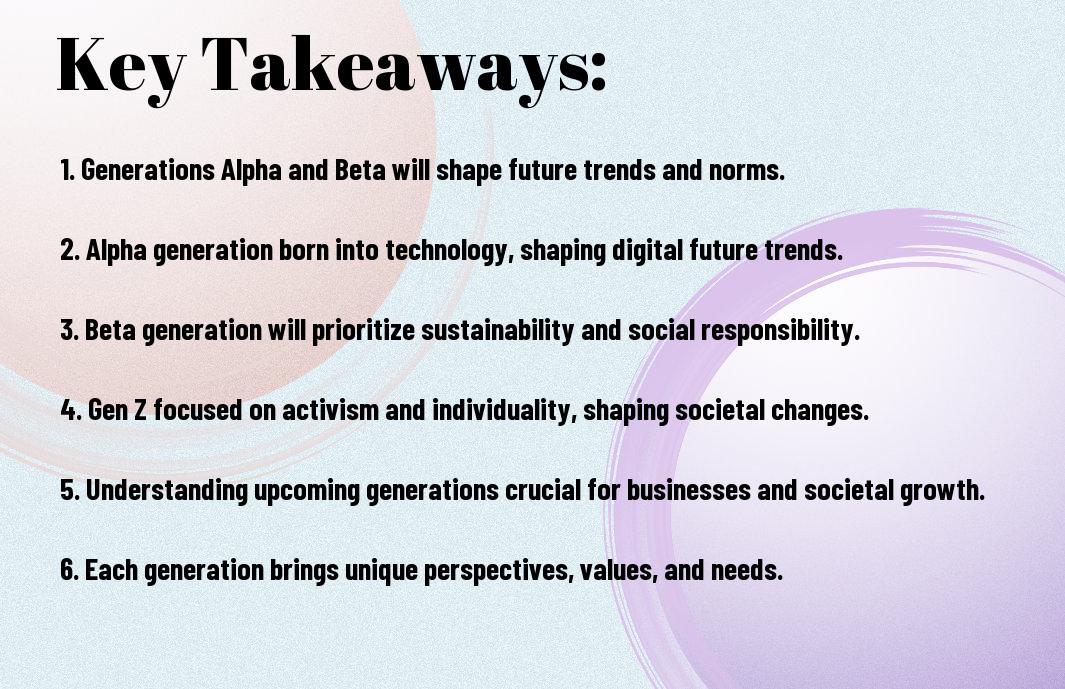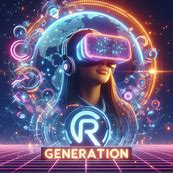There’s a constant evolution in generational cohorts, shaping the world we live in. As Millennials and Gen Z begin to take center stage, it’s imperative to look beyond and research into the etymology of the upcoming generations. Understanding the origins and characteristics of these future cohorts can provide valuable insights into their values, behaviors, and impact on society. By examining the trends and changes in generational dynamics, we can better prepare for the shifts that lie ahead.

The Evolution of Generational Terms
Some of the most commonly used terms to describe generations, such as Baby Boomers, Gen X, Millennials, and Gen Z, have become ubiquitous in our everyday conversations and media. But as time progresses and new cohorts come of age, there arises a need to reevaluate and update our understanding of generational categories.
Generational Historical Overview
Generational terms have been used for decades to categorize and better understand the characteristics and experiences of individuals who were born around the same time. The concept of defining generations can be traced back to the Baby Boomers, who were born in the post-World War II years. Since then, each generation has been defined by unique historical events, technological advancements, and cultural shifts that shape their worldview and behavior.
Over time, the labels used to describe these cohorts have evolved to reflect the changing dynamics of society. From the skepticism of Gen X to the digital natives of Gen Z, generational terms have become more than just descriptors; they are markers of identity and shared experiences.
The Impact of Socio-Cultural Change
The continuous evolution of generational terms is a testament to the ever-changing landscape of society and culture. Each generation is shaped by the social, political, and economic factors of their time, influencing their values, beliefs, and behaviors. The impact of socio-cultural change on generational definitions can be seen in the rapid adoption of technology, shifting family structures, and changing attitudes towards work and social issues.
The categorization of generations serves as a valuable tool for researchers, marketers, and policymakers to understand the diverse needs and preferences of different age groups. By recognizing the unique characteristics and experiences of each generation, we can better adapt our strategies and policies to effectively engage and support individuals across the generational spectrum.
Overview: As society continues to evolve, so too must our understanding of generational terms. By examining the historical context and socio-cultural influences that shape each generation, we can gain valuable insights into the diverse perspectives and behaviors of individuals across different age groups.
Post-Z Generations: The Alpha and Beyond
Even as Generation Z begins to take center stage, discussions have already shifted towards the upcoming generations that will shape the future – Generation Alpha and beyond. With technological advancements and societal changes accelerating at a rapid pace, it is vital to examine the characteristics and predictions for these post-Z generations to understand the direction in which they are heading.
Characteristics of Generation Alpha
Alpha is the first letter of the Greek alphabet, symbolizing a new beginning and a fresh start. Generation Alpha includes those born from 2010 onwards, growing up in a world where technology is seamlessly integrated into every aspect of their lives. These digital natives are raised in an era of artificial intelligence, virtual reality, and instant connectivity, shaping their worldview and approach to problem-solving.
With a strong emphasis on creativity, collaboration, and adaptability, Generation Alpha is expected to be highly entrepreneurial and innovative. They are likely to be global citizens, with a keen awareness of environmental issues and social causes, driven by a desire to make a positive impact on the world from a young age.
Predictions for Post-Alpha Generations
An exploration of the post-Alpha generations reveals a landscape that is constantly evolving and challenging traditional norms. As technology continues to advance and societal structures undergo transformation, the generations following Alpha are expected to be even more interconnected, diverse, and dynamic.
Predictions for Post-Alpha Generations: The future generations are likely to have unprecedented access to information and resources, enabling them to tackle global challenges with innovative solutions.
Etymological Insights
Keep reading to probe into the fascinating world of the etymology of upcoming generations.
The Process of Naming New Generations
Etymological insights into the process of naming new generations reveal a mix of artistic creativity, cultural reflection, and marketing strategies. As each generation comes of age, sociologists, marketers, and the general public seek names that encapsulate the unique characteristics and trends of that group. From Baby Boomers to Millennials and Gen Z, the naming process involves more than just selecting a catchy label; it shapes how these generations are perceived in society.
The selection of a generation’s moniker can have lasting effects on how individuals within that group identify themselves and how they are viewed by others. These names not only serve as a way to categorize and differentiate age groups but also carry connotations and stereotypes that can influence societal attitudes. Understanding the motives and methods behind naming generations provides valuable insights into the dynamics of intergenerational relationships and cultural evolution.
The Role of Language in Shaping Identity
On the surface, language may seem like a neutral tool for communication, but its influence on shaping identity is profound and far-reaching. The words we use to describe ourselves and others not only reflect societal perceptions but also contribute to the construction of individual and collective identities. For upcoming generations, the language used to define and categorize them can play a crucial role in how they perceive themselves and how they are perceived by society.
Role: The language used to describe generations can either empower or constrain individuals within those groups. Words have the power to shape attitudes, create stereotypes, and influence behavior. It is important to approach the naming of new generations with sensitivity and awareness of the impact that these labels can have on individuals’ sense of self and belonging in society.

Preparing for the Future
Societal Implications of Emerging Generations
Preparing for the future involves understanding and anticipating the societal implications that will arise from the emergence of new generational cohorts. As the landscape of technology, communication, and social interaction continues to evolve, these emerging generations will bring forth a set of values, norms, and behaviors that may significantly impact how our society operates.
It is imperative for businesses, policymakers, educators, and parents to prepare for the unique characteristics of these upcoming generations. By staying informed and proactive, we can better navigate the challenges and opportunities that come with the changing demographic landscape.
Adapting to the Needs of New Generational Cohorts
Adapting to the needs of new generational cohorts requires a deep understanding of their preferences, communication styles, and aspirations. Organizations that adapt their strategies and offerings to cater to the needs of these emerging generations will be better positioned for success in the future.
By embracing innovation, diversity, and flexibility, businesses can create environments that foster creativity and collaboration, appealing to the values and expectations of the incoming workforce. Adapting to the needs of new generational cohorts is not just a recommendation but a necessity for thriving in the ever-evolving marketplace.
Adapting to the needs of new generational cohorts requires a shift in mindset and a willingness to embrace change. By recognizing the unique perspectives and preferences of these emerging generations, we can create a more inclusive and dynamic society that is well-equipped to tackle the challenges of the future.
Summing up
Presently, examining the ethymology of the upcoming generations beyond Millennials and Gen Z sheds light on the evolving landscape of society and culture. Understanding the characteristics, values, and preferences of these upcoming generations is crucial for businesses, educators, and policymakers to adapt and thrive in the rapidly changing world. By recognizing the unique traits and influences shaping these generations, we can better prepare for the challenges and opportunities that lie ahead. As we investigate deeper into the intricacies of future generations, it becomes evident that each cohort brings its own set of traits and perspectives that will continue to shape the world in unforeseen ways.


